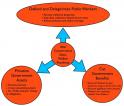Walker’s Wisconsin Blueprint for Neo-Feudalism
My first post here at Dirty Hippies was about the terrible [anti-]journalism at the National Journal. So it’s only fair that my second should revolve around a truly excellent piece of journalism there, Bait and Switch? Walker’s budget plans don’t fix what he says is the crisis. By Tim Fernholz.
Tim’s starting point of analysis is similar to mine in my story “Democracy Comes to Wisconsin” for the current issue of Random Lengths News: There’s a very simple, non-controversial, but time-sensitive fix for the short-term $137 million deficit Walker identifies, and his controversial actions have nothing to do with that. In my story, I go into some detail about how this was clearly laid out in Walker’s Feb 11 press release, for anyone who read it critically, particularly this line: ““The budget repair will also restructure the state debt, lowering the state’s interest rate, saving the state $165 million.” My story goes into more detail about screwing the workers, and Walker’s move as an example of Naomi Klein’s Shock Doctrine in action, and that’s perfectly appropriate, given the frontal assault on workers’ rights and the fact that we serve a strong working-class constituency (our biggest drop-off point is inside the ILWU union hall, the only non-labor publication distributed there).
But Fernholz takes a more comprehensive look at other things going on in Walker’s budget as well, and Mike Konczal at Rortybomb has followed up with a piece, “Walker’s Budget Plan is a Three-Part Roadmap for Conservative State Governance” that includes this handy-dandy graphic showing just what’s up:
Here’s Konczal:
There’s a three-prong approach in Governor Walker’s plan that highlights a blueprint for conservative governorship after the 2010 election. The first is breaking public sector unions and public sector workers generally. The second is streamlining benefits away from legislative authority, especially for health care and in fighting the Health Care Reform Act. The third is the selling of public assets to private interests under firesale and crony capitalist situations.
Spelling things out a bit more explicitly, this is from Fernholz’s original story:
The bill includes a provision that would allow the state to sell or contract out the operation of heating, cooling, and power plants without a bidding process and without consulting the state’s independent utility regulator. Democratic legislators worried aloud that the process would attract abuse, and Jon Peacock, director of the Wisconsin Budget Project, called the no-bid approach a “red flag.”
The bill also employs “emergency” powers that would allow the governor’s appointed health secretary to redefine the foundations of the state’s Medicaid program, Badgercare, ranging from eligibility to premiums, with only passive legislative review. The attorney in the legislature’s nonpartisan reference bureau who prepared the bill warned that a court could invalidate the statute for violating separation of powers doctrine.
The legislation, the lawyer wrote in a “drafter’s note” about the bill, would allow the state Department of Health Services to “change any Medical Assistance law, for any reason, at any time, and potentially without notice or public hearing… in addition to eliminating notice and publication requirements, [the changes] would leave the emergency rules in effect without any requirement to make permanent rules and without any time limit.”
Page 1 of 2 | Next page
